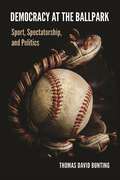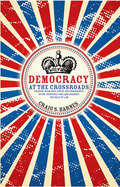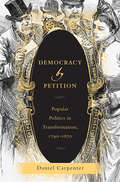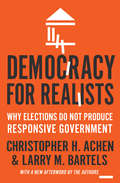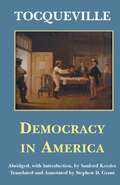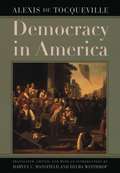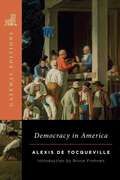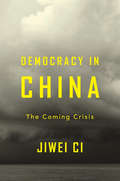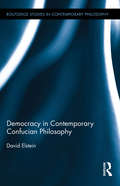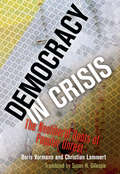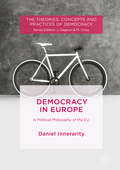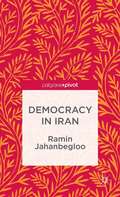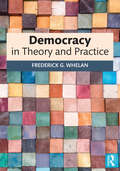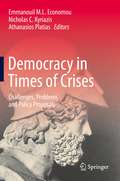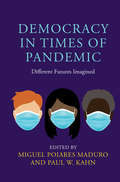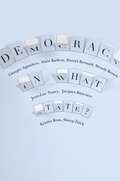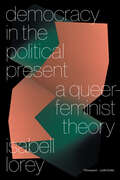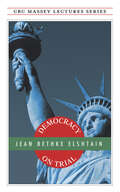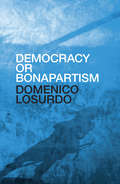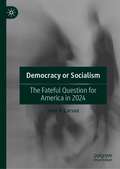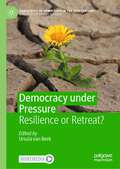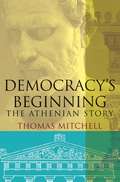- Table View
- List View
Democracy at the Ballpark: Sport, Spectatorship, and Politics
by Thomas David BuntingWhat is the relationship between sports and politics? Often, politics are thought to be serious, whereas sports are diversionary and apolitical. Using baseball as a case study, Democracy at the Ballpark challenges this understanding, examining politics as they emerge at the ballpark around spectatorship, community, equality, virtue, and technology. Thomas David Bunting argues that because spectators invest time and meaning in baseball, the game has power as a metaphor for understanding and shaping politics. The stories people see in baseball mirror how they see the country, politics, and themselves. As a result, democracy resides not only in exclusive halls tread by elites but also in a stadium full of average people together under an open sky. Democracy at the Ballpark bridges political theory and sport, providing a new way of thinking about baseball. It also demonstrates the democratic potential of spectatorship and rethinks the role of everyday institutions like sport in shaping our political lives, offering an expanded view of democracy.
Democracy at the Crossroads: Princes, Peasants, Poets, and Presidents in the Struggle for (and against) the Rule of Law (Speaker's Corner Ser.)
by Craig S. BarnesSome were warriors. Some were lawyers, some historians, some moved by an inner passion so great that they appeared to move against kingly power like moths to the flame, risking, and often giving, their lives. They wrote, cajoled, and sometimes cried out for all to hear that the law is above the king.This fascinating treatise examines how Western ideals of democracy have evolved and emerged through the ages and across continents. Craig S. Barnes shares the inspiring stories of a diverse group of men and women (whether they be leaders, poets, or peasants) who pioneered due process, habeas corpus, and the balance of powers. Exploring the premise that "democracy is not a given in social evolution," Barnes contrasts the heroic figures of history to those in recent administrations who he argues have ignored the precious nature of our inheritance and have placed democracy at risk. Democracy at the Crossroads is a stirring reminder of the fragility of our rule of law and the need for vigilant protection of our hard-won liberties.Craig S. Barnes began his career as a public interest lawyer dealing with women's rights and the environment. He was also active in politics and civil rights, running for Congress in Denver as a peace candidate in 1970. He is the author of Growing Up True and In Search of the Lost Feminine.
Democracy by Petition: Popular Politics in Transformation, 1790-1870
by Daniel CarpenterThis pioneering work of political history recovers the central and largely forgotten role that petitioning played in the formative years of North American democracy. Known as the age of democracy, the nineteenth century witnessed the extension of the franchise and the rise of party politics. As Daniel Carpenter shows, however, democracy in America emerged not merely through elections and parties, but through the transformation of an ancient political tool: the petition. A statement of grievance accompanied by a list of signatures, the petition afforded women and men excluded from formal politics the chance to make their voices heard and to reshape the landscape of political possibility. Democracy by Petition traces the explosion and expansion of petitioning across the North American continent. Indigenous tribes in Canada, free Blacks from Boston to the British West Indies, Irish canal workers in Indiana, and Hispanic settlers in territorial New Mexico all used petitions to make claims on those in power. Petitions facilitated the extension of suffrage, the decline of feudal land tenure, and advances in liberty for women, African Americans, and Indigenous peoples. Even where petitioners failed in their immediate aims, their campaigns advanced democracy by setting agendas, recruiting people into political causes, and fostering aspirations of equality. Far more than periodic elections, petitions provided an everyday current of communication between officeholders and the people. The coming of democracy in America owes much to the unprecedented energy with which the petition was employed in the antebellum period. By uncovering this neglected yet vital strand of nineteenth-century life, Democracy by Petition will forever change how we understand our political history.
Democracy for Realists: Why Elections Do Not Produce Responsive Government
by Larry M. Bartels Christopher H. AchenDemocracy for Realists assails the romantic folk-theory at the heart of contemporary thinking about democratic politics and government, and offers a provocative alternative view grounded in the actual human nature of democratic citizens.Christopher Achen and Larry Bartels deploy a wealth of social-scientific evidence, including ingenious original analyses of topics ranging from abortion politics and budget deficits to the Great Depression and shark attacks, to show that the familiar ideal of thoughtful citizens steering the ship of state from the voting booth is fundamentally misguided. They demonstrate that voters—even those who are well informed and politically engaged—mostly choose parties and candidates on the basis of social identities and partisan loyalties, not political issues. They also show that voters adjust their policy views and even their perceptions of basic matters of fact to match those loyalties. When parties are roughly evenly matched, elections often turn on irrelevant or misleading considerations such as economic spurts or downturns beyond the incumbents' control; the outcomes are essentially random. Thus, voters do not control the course of public policy, even indirectly.Achen and Bartels argue that democratic theory needs to be founded on identity groups and political parties, not on the preferences of individual voters. Now with new analysis of the 2016 elections, Democracy for Realists provides a powerful challenge to conventional thinking, pointing the way toward a fundamentally different understanding of the realities and potential of democratic government.
Democracy in America
by Alexis De Tocqueville Stephen D. Grant Sanford KesslerThis new abridged translation of Democracy in America reflects the rich Tocqueville scholarship of the past forty years, and restores chapters central to Tocqueville's analysis absent from previous abridgments--including his discussions of enlightened self-interest and the public's influence on ethical standards. Judicious notes and a thoughtful Introduction offer aids to the understanding of a masterpiece of nineteenth-century social thought that continues in our own day to illuminate debates about the roles of liberty and equality in American life.
Democracy in America
by Alexis de TocquevilleAlexis de Tocqueville (1805-59) came to America in 1831 to see what a great republic was like. What struck him most was the country's equality of conditions, its democracy. The book he wrote on his return to France, Democracy in America, is both the best ever written on democracy and the best ever written on America. It remains the most often quoted book about the United States, not only because it has something to interest and please everyone, but also because it has something to teach everyone. When it was published in 2000, Harvey Mansfield and Delba Winthrop's new translation of Democracy in America—only the third since the original two-volume work was published in 1835 and 1840—was lauded in all quarters as the finest and most definitive edition of Tocqueville's classic thus far. Mansfield and Winthrop have restored the nuances of Tocqueville's language, with the expressed goal "to convey Tocqueville's thought as he held it rather than to restate it in comparable terms of today." The result is a translation with minimal interpretation, but with impeccable annotations of unfamiliar references and a masterful introduction placing the work and its author in the broader contexts of political philosophy and statesmanship.
Democracy in America
by Alexis de TocquevilleClassic analysis of America's unique political character, quoted heavily by politicians and perennially popping up on history professors' reading lists. The book's enduring appeal lies in the eloquent, prophetic voice of Alexis de Tocqueville (1805-1859), a French aristocrat who visited the United States in 1831. A thoughtful young man in a still-young country, he succeeded in penning this penetrating study of America's people, culture, history, geography, politics, legal system, and economy. Tocqueville asserts, I confess that in America I saw more than America; I sought the image of democracy itself, with its inclinations, its character, its prejudices, and its passions, in order to learn what we have to fear or hope from its progress.
Democracy in China: The Coming Crisis
by Jiwei CiFour decades of reform fostered a democratic mentality in China. Now citizens are waiting for the government to catch up. Jiwei Ci argues that the tensions between a largely democratic society and an undemocratic political system will trigger a crisis of legitimacy, compelling the Communist Party to become agents of democratic change—or collapse.
Democracy in Contemporary Confucian Philosophy (Routledge Studies in Contemporary Philosophy)
by David ElsteinThis book examines democracy in recent Chinese-language philosophical work. It focuses on Confucian-inspired political thought in the Chinese intellectual world from after the communist revolution in China until today. The volume analyzes six significant contemporary Confucian philosophers in China and Taiwan, describing their political thought and how they connect their thought to Confucian tradition, and critiques their political proposals and views. It illustrates how Confucianism has transformed in modern times, the divergent understandings of Confucianism today, and how contemporary Chinese philosophers understand democracy, as well as their criticisms of Western political thought.
Democracy in Crisis: The Neoliberal Roots of Popular Unrest
by Christian Lammert Boris VormannLiberal democracies on both sides of the Atlantic find themselves approaching a state of emergency, beset by potent populist challenges of the right and left. But what exactly lies at the core of widespread dissatisfaction with the status quo? And how can the challenge be overcome?In Democracy in Crisis, Christian Lammert and Boris Vormann argue that the rise of populism in North Atlantic states is not the cause of a crisis of governance but its result. This crisis has been many decades in the making and is intricately linked to the rise of a certain type of political philosophy and practice in which economic rationality has hollowed out political values and led to an impoverishment of the political sphere more broadly. The process began in the 1980s, when the United States and Great Britain decided to unleash markets in the name of economic growth and democracy. After the fall of the Berlin Wall, several countries in Europe followed suit and marketized their educational, social, and healthcare systems, which in turn increased inequality and fragmentation. The result has been a collapse of social cohesion and trust that the populists promise to address but only make worse. Looking to the future, Lammert and Vormann conclude their analysis with concrete suggestions for ways politics can once again be placed in the foreground, with markets serving social relations rather than the reverse.
Democracy in Europe: Democracy, Legitimacy And Justice After The Euro Crisis (Future Perfect: Images Of The Time To Come In Philosophy, Po Ser.)
by Daniel InnerarityThis book calls for a philosophical consideration of the development, challenges and successes of the European Union. The author argues that conceptual innovation is essential if progress on the European project is to be made; new meanings, rather than financial or institutional engineering solutions, will help solve the crisis. By applying a philosophical approach to diagnosing the EU crisis, the book reconsiders the basic concepts of democracy in the context of the complex reality of the EU and the globalised world where profound social and political changes are taking place. It will be of interest to students and scholars interested in EU politics, political theory and philosophy.
Democracy in Iran
by Misagh ParsaIn Misagh Parsa's view, the outlook for democracy in Iran is stark. Gradual reforms will not be sufficient for real change: the government must fundamentally rethink its commitment to the role of religion in politics and civic life. For Iran to democratize, the options are narrowing to a single path: another revolution.
Democracy in Iran
by Ramin JahanbeglooDemocratic government is something that has eluded Iran despite a series of non-violent revolutions aimed at establishing a system of governance that would promote both public freedom and political accountability. This explores the obstacles to the growth of democracy in Iran and posits a plan for non-violent action to help Iranians achieve it.
Democracy in Moderation
by Paul O. CarreseDemocracy in Moderation views constitutional liberal democracy as grounded in a principle of avoiding extremes and striking the right balance among its defining principles of liberty, equality, religion, and sustainable order, thus tempering tendencies toward sectarian excess. Such moderation originally informed liberal democracy, but now is neglected. Moderation can guide us intellectually and practically about domestic and foreign policy debates, but also serve the sustainability of the constitutional, liberal republic as a whole. Our recent theory thus doesn't help our practice, given our concerns about polarization and sectarianism in ideas, policy, and politics. A rediscovery of Montesquieu and his legacy in shaping America's complex political order, including influence on Washington's practical moderation and Tocqueville's philosophical moderation, addresses these enduring theoretical and practical problems. Moderation also offers a deeper theory of leadership or statesmanship, particularly regarding religion and politics, and of foreign policy and strategy rooted in liberal democracy's first principles.
Democracy in Theory and Practice
by Frederick G. WhelanDemocracy in Theory and Practice presents an authoritative overview of democratic theory today. Its distinctive approach links theory to practice, emphasizing the wide variety of institutions and procedures through which core democratic principles are implemented and the normative and practical dimensions of the choices to be made among these alternatives. Designed for courses at both the undergraduate and graduate level, the book features eighteen chapters organized thematically and divided into sections and subsections for easy reference; historical and current examples, citations for specific ideas, annotated references, and further readings throughout enhance the volume's utility for students, scholars, and researchers. Sidebars give biographical sketches of classic theorists and democratic ideas from the US founders and constitutional tradition. Featured topics discussed include: Majority Rule; Participation; Deliberation; Accountability; Representation; Constitutionalism; Electoral Laws; Parties; Legislative, Executive, and Judicial Functions. The Boundary Problem; The "All-Affected" Principle; Contested Senses of Liberal and Procedural Democracy; The Pros and Cons of Term Limits; Proportional Representation; Referendums; Problems of Democratic Transparency and Reversibility. Written by a leading authority in the field, Frederick G. Whelan encourages us to think of the many alternative ways of putting democracy into practice and of these alternatives as requiring choices. This diversity means that there is no unique or correct democratic outcome from a given set of preferences, since outcomes are shaped by the methods followed in reaching them.
Democracy in Times of Crises: Challenges, Problems and Policy Proposals
by Nicholas C. Kyriazis Emmanouil M.L. Economou Athanasios PlatiasInspired by the democratic origins of the Greek naval victory at Salamis, the book discusses the current pressing issues of democracy worldwide. In 12 carefully selected chapters, well-renowned scholars from around the globe discuss topics such as Brexit, Euroscepticism, or the rise of populism. The authors further analyze various aspects of democracy, as well as various types of democratic regimes, such as mixed government, direct democracy, and cases of quasi democracies. While doing so, they relate this discussion to the pivotal question of how the quality of democracy today can be improved, seeking answers and solutions to current pending problems at the global level. This book is the second out of two edited volumes as a sequel of an international academic conference titled Salamis and Democracy: 2500 Years After that took place between October 3rd and October 5th, 2020, on the occasion of the 2500th anniversary of the great historical event of the Battle of Salamis, which saved Greek culture and the newly founded democratic regimes throughout the Hellenic world during the Classical period (508-323 BCE). The book is a must-read for scholars and students of political science, economics, and law, as well as policy-makers interested in a better understanding of democracy, governance, populism, social choice, and constitutional law.
Democracy in Times of Pandemic: Different Futures Imagined
by Paul W. Kahn Miguel Poiares MaduroThe COVID-19 pandemic has presented an important case study, on a global scale, of how democracy works - and fails to work - today. From leadership to citizenship, from due process to checks and balances, from globalization to misinformation, from solidarity within and across borders to the role of expertise, key democratic concepts both old and new are now being put to the test. The future of democracy around the world is at issue as today's governments manage their responses to the pandemic. Bringing together some of today's most creative thinkers, these essays offer a variety of inquiries into democracy during the global pandemic with a view to imagining post-crisis political conditions. Representing different regions and disciplines, including law, politics, philosophy, religion, and sociology, eighteen voices offer different outlooks - optimistic and pessimistic - on the future.
Democracy in What State?
by Giorgio Agamben Wendy Brown William Mccuaig Alain Badiou Daniel Bensaid Jean-Luc Nancy Kristin Ross"Is it meaningful to call oneself a democrat? And if so, how do you interpret the word?"In responding to this question, eight iconoclastic thinkers prove the rich potential of democracy, along with its critical weaknesses, and reconceive the practice to accommodate new political and cultural realities. Giorgio Agamben traces the tense history of constitutions and their coexistence with various governments. Alain Badiou contrasts current democratic practice with democratic communism. Daniel Bensaid ponders the institutionalization of democracy, while Wendy Brown discusses the democratization of society under neoliberalism. Jean-Luc Nancy measures the difference between democracy as a form of rule and as a human end, and Jacques Rancière highlights its egalitarian nature. Kristin Ross identifies hierarchical relationships within democratic practice, and Slavoj i ek complicates the distinction between those who desire to own the state and those who wish to do without it. Concentrating on the classical roots of democracy and its changing meaning over time and within different contexts, these essays uniquely defend what is left of the left-wing tradition after the fall of Soviet communism. They confront disincentives to active democratic participation that have caused voter turnout to decline in western countries, and they address electoral indifference by invoking and reviving the tradition of citizen involvement. Passionately written and theoretically rich, this collection speaks to all facets of modern political and democratic debate.
Democracy in What State? (New Directions in Critical Theory #11)
by Giorgio Agamben Slavoj Žižek Wendy Brown Alain Badiou Daniel Bensaid Jean-Luc Nancy Kristin Ross Jacques Rancière"Is it meaningful to call oneself a democrat? And if so, how do you interpret the word?"In responding to this question, eight iconoclastic thinkers prove the rich potential of democracy, along with its critical weaknesses, and reconceive the practice to accommodate new political and cultural realities. Giorgio Agamben traces the tense history of constitutions and their coexistence with various governments. Alain Badiou contrasts current democratic practice with democratic communism. Daniel Bensaid ponders the institutionalization of democracy, while Wendy Brown discusses the democratization of society under neoliberalism. Jean-Luc Nancy measures the difference between democracy as a form of rule and as a human end, and Jacques Rancière highlights its egalitarian nature. Kristin Ross identifies hierarchical relationships within democratic practice, and Slavoj Zizek complicates the distinction between those who desire to own the state and those who wish to do without it.Concentrating on the classical roots of democracy and its changing meaning over time and within different contexts, these essays uniquely defend what is left of the left-wing tradition after the fall of Soviet communism. They confront disincentives to active democratic participation that have caused voter turnout to decline in western countries, and they address electoral indifference by invoking and reviving the tradition of citizen involvement. Passionately written and theoretically rich, this collection speaks to all facets of modern political and democratic debate.
Democracy in the Political Present: A Queer-Feminist Theory
by Isabell Lorey&“Presentist democracy is without a people and without nation. Rather than regimes of borders and migration, its borders are sexism and racism, homo- and transphobia, colonialism and extractivism.&”In the midst of the crises and threats to liberal democracy, Isabell Lorey develops a democracy in the present tense; one which breaks open political certainties and linear concepts of progress and growth. Her queer feminist political theory formulates a fundamental critique of masculinist concepts of the people, representation, institutions, and the multitude. In doing so, she unfolds an original concept of a presentist democracy based on care and interrelatedness, on the irreducibility of responsibilities—one which cannot be conceived of without social movements&’ past struggles and current practices.
Democracy on Trial (The CBC Massey Lectures)
by Jean Bethke ElshtainIs democracy as we know it in danger? More and more we confront one another as aggrieved groups rather than as free citizens. Deepening cynicism, the growth of corrosive individualism, statism, and the loss of civil society are warning signs that democracy may be incapable of satisfying the yearnings it itself unleashes - yearnings for freedom, fairness, and equality. In her 1993 CBC Massey Lectures, political philosopher Jean Bethke Elshtain delves into these complex issues to evaluate democracy's chances for survival.
Democracy or Bonapartism: Two Centuries of War on Democracy
by Domenico LosurdoHOW AN IRON FIST DONNED DEMOCRACY&’S VELVET GLOVEThe history of universal suffrage is best understood as a conflict between liberal elites and democractic workers&’ movements, according to Domenico Losurdo. John Stuart Mill, for example, argued that electoral influence should be more pronounced among the educated – and wealthy – than among those working with their hands. Every vote ought not to be counted the same. Countries with deep liberal roots have historically been quick to restrain the spread of the franchise, persisting in discrimination based on property, race, and gender. In this context, the rise of popular presidents and premiers, vested with extraordinary powers, has served to stimy attempts to associate politically and mobilize for meaningful change.This is modern Bonapartism, a soft authoritarianism in which popularity, stirred up by a news media dominated by the interests of the rich, replaces true democratic expression. As alternatives to this system drift toward the horizon, Bonapartism is set to become the dominant political regime of our era. Understanding the history of its development and the contradictory forces behind it may permit us to move towards true democracy.Praise for LIBERALISM: A COUNTER-HISTORY&‘Losurdo is almost unbelievably well-read&’- JACOBIN&‘A brilliant exercise in unmasking liberal pretensions, surveying over three centuries with magisterial command of the sources&’- FINANCIAL TIMES&‘Stimulatingly uncovers the contradictions of an ideology that is much too self-righteously invoked&’- PANKAJ MISHRA, GUARDIAN&‘A book of wide reference and real erudition&’- TIMES LITERARY SUPPLEMENT&‘The book is a historically grounded, very accessible critique of liberalism, complementing a growing literature critical of liberalism&’- CHOICEPraise for WAR AND REVOLUTION: RETHINKING THE TWENTIETH CENTURY&‘War and Revolution is a relentless document. It is dense and disconcerting. This is precisely why it should be considered one of the most important history books written since 9/11&’- RON JACOBS, COUNTERPUNCH
Democracy or Socialism: The Fateful Question for America in 2024
by Sven R. LarsonThis book discusses socialism and democracy. It approaches socialism not as a label but as an ideology. Based on a careful examination of what socialism is, traced back to Karl Marx, this book explains the tense relationship between socialism and democracy and how it has influenced political thought and practice in both Europe and America. This book carefully avoids conventional wisdom, seeking instead to originate its definition and analysis of socialism in its political theory and practice. Building on the relationship between socialism and democracy, the book explores how this uneasy roommate agreement may affect America’s future.
Democracy under Pressure: Resilience or Retreat? (Challenges to Democracy in the 21st Century)
by Ursula Van BeekThis book identifies the main factors shaping the fortunes of democracy globally. Why do some democracies in the same region and presumably subject to similar global influences remain stable while others regress? This is the question guiding all the authors of this edited book. In the search for answers, they examine 16 democracies in paired and tripled comparisons in sub-Saharan Africa, North and Latin America, East Asia, Western and Central Europe, along with two polar cases. Insights from the perspectives of history, political science, economics and international relations are offered along with a sketch of possible future scenarios. Combining approaches anchored in the analytical tradition with empirical case studies and given the broad range of topics, this book is bound to be of interest not only to students and practitioners of democracy but also to the broader academic and general readership.
Democracy's Beginning: The Athenian Story
by Thomas N. MitchellA history of the world&’s first democracy from its beginnings in Athens circa fifth century B.C. to its downfall 200 years later. The first democracy, established in ancient Greece more than 2,500 years ago, has served as the foundation for every democratic system of government instituted down the centuries. In this lively history, author Thomas N. Mitchell tells the full and remarkable story of how a radical new political order was born out of the revolutionary movements that swept through the Greek world in the seventh and sixth centuries B.C., how it took firm hold and evolved over the next two hundred years, and how it was eventually undone by the invading Macedonian conquerors, a superior military power. Mitchell&’s history addresses the most crucial issues surrounding this first paradigm of democratic governance, including what initially inspired the political beliefs underpinning it, the ways the system succeeded and failed, how it enabled both an empire and a cultural revolution that transformed the world of arts and philosophy, and the nature of the Achilles heel that hastened the demise of Athenian democracy. &“A clear, lively, and instructive account…. [Mitchell] has mastered the latest scholarship in the field and put it to good use in interpreting the ancient sources and demonstrating its character and importance in shaping democratic thought and institutions throughout the millennia.&”—Donald Kagan, author of The Peloponnesian War &“[Mitchell&’s] close scholarship shines in documenting the transition of Athens from financially and morally bankrupt oligarchy to emancipated democracy 2,500 years ago…with a commendable attention to detail that beautifully captures the essence of ancient Greek culture and politics.&”—Roslyn Fuller, Irish Times
